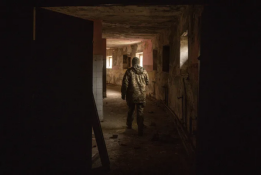
Survivors Report Widespread Sexual Violence by Russian Forces in Occupied Areas of Ukraine, With Men Mostly Been Victims
By Fiona Nanna, Thursday May 30, 2024
Editor’s Note: This story contains graphic and disturbing descriptions of sexual violence.
Kyiv — Within an hour of being detained by Russian security forces, Roman Shapovalenko faced threats of rape.
On August 25, 2022, the day after Ukraine’s Independence Day, three armed, masked officers from Russia’s Federal Security Service (FSB) raided Shapovalenko’s home in Kherson, then under Russian occupation. They found a message on his phone referring to Russian soldiers as “orcs,” a derogatory term used by Ukrainians. He was tied up, blindfolded, and taken away in an unmarked car.
For days, Shapovalenko endured electrocution on his genitals, threats of rape with a glass bottle, and the fear of sterilization. “They seemed to have a fetish for genitalia,” the 39-year-old farm manager recounted. His attempts at humor often led to more violence from his captors.
Shapovalenko’s experience is a stark example of the widespread sexual violence reported by Ukrainians, both civilians and soldiers, detained since Russia’s invasion began over two years ago. Human rights monitors have long documented sexual violence by Russian police and security forces against prisoners in Russia, a practice now exported to occupied Ukraine.
Male victims are increasingly speaking out, though stigma and shame often keep these crimes hidden. In 2023, the UN documented 85 cases of conflict-related sexual violence in Ukraine, affecting 52 men, 31 women, one girl, and one boy. Interviews with 60 released Ukrainian prisoners of war revealed that 39 had been sexually abused while in Russian detention.
CNN interviewed four male survivors, obtaining testimonies from two more. These men, detained in Kherson, Donetsk, Zaporizhzhia, Kharkiv, and Crimea, described forced nudity, genital electrocution with Soviet-era military field telephones, and threats of rape. Their stories align with cases documented by regional prosecutors and witnesses.
Prosecutors describe Russia’s use of sexual violence as systematic and ongoing. “They use the same methods of committing sexual violence and humiliation,” said Anna Sosonska, acting chief of the conflict-related sexual violence division in Ukraine’s Office of the Prosecutor General. Many documented cases involve electric shocks to the genitals.
‘They All Laughed’
Roman Chernenko, a 29-year-old Ukrainian intelligence officer, spent seven months in a “punishment cell” in Olenivka, in the occupied Donetsk region. Tortured up to three times daily for four months, he described a military phone device used for genital electrocution. “Tapik is a military phone with two wires. One is connected to your balls, the other to your finger, and they just keep turning the current up,” he said.
Released in January 2024, Chernenko is still recovering. His captors, he believes, were from Russia’s GRU, FSIN, and FSB. “They laughed when they tortured me,” he said, recalling threats against his mother and staged executions.
Despite numerous allegations, Russia’s Ministry of Defense and other agencies have not responded to CNN’s inquiries. Under international law, rape and sexual violence are war crimes and can constitute crimes against humanity.
A Systematic Approach
Ukraine has recorded 293 cases of sexual violence, though the real number is likely higher, especially in inaccessible occupied territories. Some 37,000 Ukrainians remain unaccounted for, with thousands believed to be at risk of torture and sexual violence in Russian detention.
Sosonska’s office educates the public about male victims of sexual violence, essential for future prosecutions. Human rights organizations report that Russian troops use sexual violence as “punishment,” targeting relatives of Ukrainian soldiers.
The Ukrainian ombudsman’s office and military intelligence service believe that Rosgvardia and the FSB drive the campaign of torture and sexual violence. Several identified perpetrators include Rosgvardia and FSB officials, with some cases currently in court, albeit in absentia.
Survivors Seek Justice
Prosecutors aim to hold both direct perpetrators and their commanders accountable, collecting evidence for international courts. Ukraine’s prosecutors have issued numerous indictments and sentences, though none of the alleged perpetrators are in Ukrainian custody.
Andrii, a Kherson resident, described hearing the screams of fellow detainees being tortured. He witnessed a man raped with a baton in front of others. Ukrainian prosecutors have documented various objects used in sexual assaults by Russian forces.
Determined to Expose the Truth
Survivors like Oleksii Sivak, who was tortured after putting up Ukrainian flags, stress the need to tell the world about these atrocities. “The most terrible thing is not what I am telling you now. The most terrible thing is that it is happening now in the occupied territories,” Shapovalenko said.
Ukraine prepares for a long battle to bring justice to victims, ensuring that the world knows the full extent of these war crimes.

